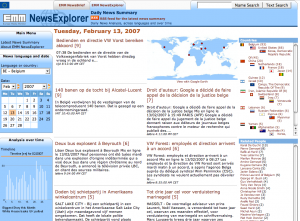 Did i get your attention? Now lets have a look at the details.
Did i get your attention? Now lets have a look at the details.
Act I: Copiepresse vs. the Search Engines
Last september a considerable amount of buzz was generated by the ruling of a belgian court that:
Pursuant to the law dd. 15m June 1935 on the use of languages in judicial matters;
Rejecting all other conclusions other than more extensive or contrary; Declare the claim admissible and founded as follows:
– Find that the defendant cannot exercise any exception provided in the law relating to copyright and ancillary rights (1991) and on the law on data bases (1998);
– Find that the activities of Google News and the use of the “Google cached violate in particular the laws on copyright and ancillary rights (1994) and the law on data bases (1998);
(complete text of the ruling).
Plaintiff in this case was Copiepresse (on behalf of its members a number of belgian newspapers). Later some other organizations (SOFAM, S.A.J, S.C.A.M, Pressbanking joined in. This ruling was more or less confirmed in February of this year. The full ruling (local copy) of 33 pages is definitely an interesting read since it gives an overview of the history at the start of the document.
Google appealed at the beginning of July with a hearing expected on July 17th, but it was expected that this date would be used to request an extension of its right to appeal, pending negotiations. I haven’t heard what actually happened on July 17th. Does anybody know?
More on the dispute can e.g. be found here, here , here and here
Earlier this year Copiepresse also accused Yahoo! of violating copyright and also warned Microsoft (see here).
Act II: ACAP to the rescue, EU commision: No support for free riders
The first ruling was instanteneously used by the different publishing organizations to promote their cause and especially to promote the ACAP project.
The press release anouncing the ACAP project was more or less ushered out of the door with a lead paragraph reading:
In the week that the publishers of Le Soir and La Libre Belgique won their case in the Belgian Courts against Google for illegally publishing content on its news service without prior consent, the World Association of Newspapers (W.A.N.), the European Publishers Council (E.P.C.) the International Publishers Association (I.P.A.) and the European Newspapers Association (E.N.P.A), are preparing to launch a global industry pilot project that aims to avoid any future clash between search engines and newspaper, periodical, magazine and book publishers. (full text)
I have written quite a bit about the ACAP project (see here, here and here) and full disclosure talked my employer dpa the german news agency into joining ACAP as a member to get a better understanding of the goals and the technology actually used. Unfortunately there is not a lot to see and learn right now as a visit to the ACAP midterm conference revealed to me. (Read some comments on the conference over here and here
As a project driven by lobbying organizations it is not surprising that these organizations and the ACAP project try to lobby, embrace and use the EU commision for their cause, resulting in sentences like this:
The EPC members welcomed Mr Barroso’s clear statement that he did not support free riders on the investment of publishers. As policies develop in the field of digital libraries, copyright more generally or eCommerce he recognised that we shall need to rely on strong copyright protection to fight piracy as well as to foster further investment and innovation in digital media research and development. (full text)
and appearances of a senior representative of the EU commision at the ACAP midterm conference.
